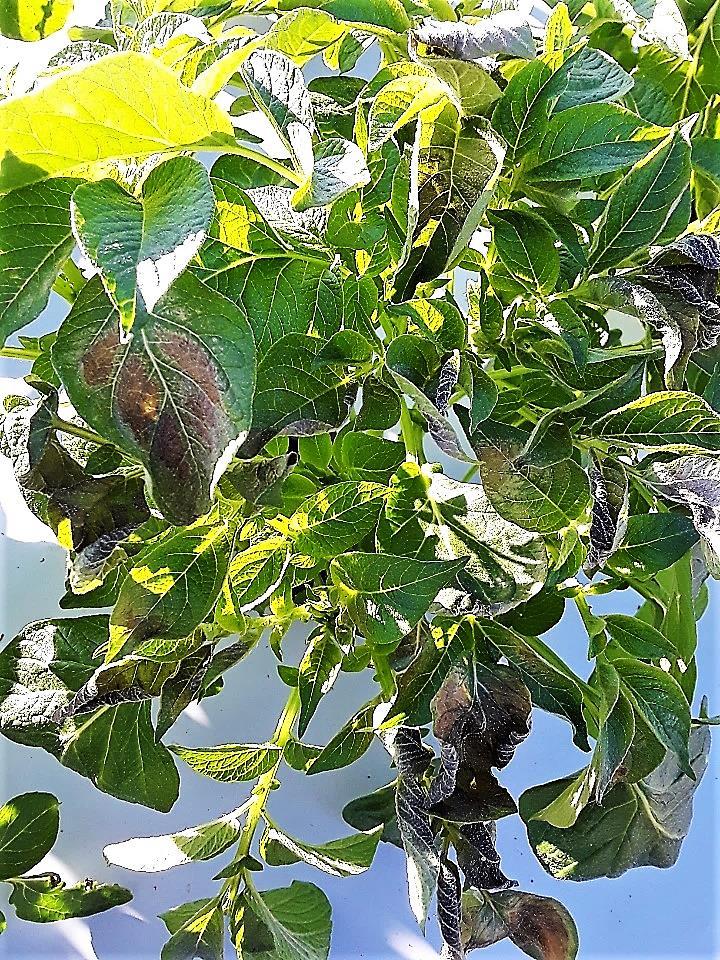Odd Cold Damage in Potato Field

An odd cold/frost event occurred in a potato field just this past weekend (May 9 and 10). On Saturday morning the grower noticed dark brown necrotic areas appearing on some of their potato plants (fig. 1). Up-close some of the leaves with the necrotic areas appeared to have white fuzz on the underside of the leaf (fig. 2), which could indicate late blight. What was especially worrisome is that this occurred on only one potato cultivar, all the other several cultivars in this same field had no necrotic areas on their foliage. Upon closer inspection the white material on the underside of the leaf in figure 2 looks to be the plant’s trichomes (hair-like growths that serve to enclose still air and protect the plant against water loss and sudden fluctuations in atmospheric temperature, i.e., frosts) that appear especially white at this particular time, not sure if that was due to the contrast to the darkness of the damaged leaf area, the weather conditions or the angle of the photo and the position of the sun. I think everyone who saw the damaged potato leaves thought it was cold damage, but why only this one variety out of all of them? Normally if an abiotic event like a frost occurs in a field it affects much of the field in about the same way.
Just speculating here but when I looked up information about this particular variety I found that it had a ‘medium’ susceptibility to frost/cold damage, not sure what the other varieties had but this damaged variety may have just been slightly more susceptible to a light frost compared with the others in the field either through genetics or possibly by being at a slightly more vulnerable stage of growth (even by just a few days) compared with the others. It also could be due to where this one variety was positioned in the field (cultivars were planted within a group in the field). It may have happened to be in a microclimate that had temperatures slightly below (0.5-1.0 degree) what the rest of the field was exposed to. Unfortunately by Sunday the question was kind of moot as the entire field was hit moderately hard by the cold from the night before and all cultivars suffered some damage (this is what is expected). But this and other occurrences over the last couple of weeks demonstrate how weather can affect our crops in ways that are unexpected and hard to figure out at times.
 English
English العربية
العربية Български
Български 简体中文
简体中文 繁體中文
繁體中文 Hrvatski
Hrvatski Čeština
Čeština Dansk
Dansk Nederlands
Nederlands Suomi
Suomi Français
Français Deutsch
Deutsch Ελληνικά
Ελληνικά हिन्दी
हिन्दी Italiano
Italiano 日本語
日本語 한국어
한국어 Norsk bokmål
Norsk bokmål Polski
Polski Português
Português Română
Română Русский
Русский Español
Español Svenska
Svenska Català
Català Filipino
Filipino עִבְרִית
עִבְרִית Bahasa Indonesia
Bahasa Indonesia Latviešu valoda
Latviešu valoda Lietuvių kalba
Lietuvių kalba Српски језик
Српски језик Slovenčina
Slovenčina Slovenščina
Slovenščina Українська
Українська Tiếng Việt
Tiếng Việt Shqip
Shqip Eesti
Eesti Galego
Galego Magyar
Magyar Maltese
Maltese ไทย
ไทย Türkçe
Türkçe فارسی
فارسی Afrikaans
Afrikaans Bahasa Melayu
Bahasa Melayu Kiswahili
Kiswahili Gaeilge
Gaeilge Cymraeg
Cymraeg Беларуская мова
Беларуская мова Íslenska
Íslenska Македонски јазик
Македонски јазик יידיש
יידיש Հայերեն
Հայերեն Azərbaycan dili
Azərbaycan dili Euskara
Euskara ქართული
ქართული Kreyol ayisyen
Kreyol ayisyen اردو
اردو বাংলা
বাংলা Bosanski
Bosanski Cebuano
Cebuano Esperanto
Esperanto ગુજરાતી
ગુજરાતી Harshen Hausa
Harshen Hausa Hmong
Hmong Igbo
Igbo Basa Jawa
Basa Jawa ಕನ್ನಡ
ಕನ್ನಡ ភាសាខ្មែរ
ភាសាខ្មែរ ພາສາລາວ
ພາສາລາວ Latin
Latin Te Reo Māori
Te Reo Māori मराठी
मराठी Монгол
Монгол नेपाली
नेपाली ਪੰਜਾਬੀ
ਪੰਜਾਬੀ Afsoomaali
Afsoomaali தமிழ்
தமிழ் తెలుగు
తెలుగు Yorùbá
Yorùbá Zulu
Zulu ဗမာစာ
ဗမာစာ Chichewa
Chichewa Қазақ тілі
Қазақ тілі Malagasy
Malagasy മലയാളം
മലയാളം සිංහල
සිංහල Sesotho
Sesotho Basa Sunda
Basa Sunda Тоҷикӣ
Тоҷикӣ O‘zbekcha
O‘zbekcha አማርኛ
አማርኛ Corsu
Corsu Ōlelo Hawaiʻi
Ōlelo Hawaiʻi كوردی
كوردی Кыргызча
Кыргызча Lëtzebuergesch
Lëtzebuergesch پښتو
پښتو Samoan
Samoan Gàidhlig
Gàidhlig Shona
Shona سنڌي
سنڌي Frysk
Frysk isiXhosa
isiXhosa